Write sentences about ways to protect and preserve natural places in Vietnam. Use the prompts in the table.
(Viết câu về cách bảo vệ và giữ gìn các địa điểm tự nhiên ở Việt Nam. Sử dụng gợi ý trong bảng.)

We shouldn’t use plastic bottles. (Chúng ta không nên sử dụng chai nhựa.)
We should clean up our garbage. (Chúng ta nên dọn rác của chúng ta.)
We shouldn’t hunt wild animals. (Chúng ta không nên săn bắt động vật hoang dã.)
We should plant more trees. (Chúng ta nên trồng thêm cây xanh.)
We shouldn’t feed wild animals. (Chúng ta không nên cho động vật hoang dã ăn.)

Các bài tập cùng chuyên đề
1. Circle the correct answers to complete the sentences.
(Khoanh vào đáp án đúng để hoàn thành câu.)
1. You must/mustn't respect older people. You can learn some valuable lessons from them.
2. We don't have to/have to wear uniforms on weekdays. It's the rule at our school.
3. You should/mustn't ask your parents for permission if you want to colour your hair.
4. In the past, women had to/must do all house work. It was one of their duties.
2. Work in pairs. Are there any rules in your family or things that you or your parents think are necessary? Share them with your partner. Use must, have to, and should.
(Làm việc theo cặp. Có bất kì luật lệ hoặc vật nào mà bạn hoặc gia đình bạn nghĩ là quan trọng? Chia sẻ nó với bạn cặp của bạn. Sử dụng must, have to và should.)
Example: (Ví dụ)
A: I have to be back home by 9 p.m.
(Tôi phải về nhà trước 9 giờ tối.)
B: Really? I don't have to. But my parents think I shouldn't stay out after 10 p.m.
(Thật sao? Tôi không cần phải làm thế. Nhưng bố mẹ tôi nghĩ tôi không nên ra ngoài sau 10 giờ tối.)
Choose the correct answers A, B, C or D to complete the following sentences.
(Chọn đáp án đúng A, B, C hoặc D để hoàn thành các câu sau.)
1. You ________________ learn to keep your bedroom tidy. No one can clean it for you.
A. must
B. had to
C. mustn't
D. shouldn't
2. Fifty years ago, my grandmother ________________ stay at home and do all housework. She couldn't go to school like her brothers.
A. must
B. had to
C. didn't have to
D. should
3. You ________________ wear shorts to school. It's against the school rules.
A. should
B. have to
C. mustn't
D. don't have to
4. I think parents ________________ compare their children to other's. They will become less confident in their abilities.
A. should
B. have to
C. must
D. shouldn’t
5. My parents respect my choices. I ________________ follow in their footsteps.
A. don't have to
B. mustn't
C. should
D. have to
3. Choose the correct answers A, B, C, or D to complete the following sentences.
(Chọn đáp án đúng A, B, C hoặc D để hoàn thành các câu sau.)
1. If you want to maintain a healthy weight, you _________ have snacks between meals.
A. shouldn't
B. should
C. must
D. don't have to
2. I __________ strictly follow the doctor’s instructions if I want to get better quickly.
A. shouldn't
B. must
C. can
D. don't have to
3. The government ___________ improve the infrastructure of big cities to boost the economy.
A. mustn't
B. doesn't have to
C. should
D. didn't have to
4. People living in high-rise buildings ___________ obey the safety rules and regulations strictly.
A. shouldn't
B. mustn't
C. may
D. have to
5. Lots of women in the past ___________ stay at home, look after their children, and do all housework.
A. must
B. should
C. had to
D. have to
6. My parents respect my career choice, so I __________ follow in their footsteps.
A. mustn’t
B. don‘t have to
C. should
D. shouldn't
4. Read the Learn this! box. Then complete sentences 1-3 using the words in brackets. Do not change the words, but add extra words if necessary.
(Đọc khung Learn this! Sau đó hoàn thành các câu 1-3 bằng cách sử dụng các từ trong ngoặc. Không thay đổi các từ, nhưng thêm các từ bổ sung nếu cần thiết.)
1. You___________ (ought / find out) about his hobbies.
2. I ___________ (think / should / send) him an email
3. You___________ (ought / take) a present for the parents.
6. SPEAKING Work in pairs. Student A is an English student who is going to stay with Student B's family next month. Ask for and give advice about these topics.
(Làm việc theo cặp. Sinh viên A là một sinh viên người Anh sẽ ở với gia đình của sinh viên B vào tháng tới. Yêu cầu và đưa ra lời khuyên về các chủ đề này.)
1. Suitable presents for the family you're staying with
(Những món quà thích hợp cho gia đình bạn đang ở cùng)
2. How to stay safe when you're out
(Làm thế nào để giữ an toàn khi bạn ra ngoài)
3. Suitable clothing for the season.
(Trang phục phù hợp theo mùa.)
4. How to improve your language skills quickly.
(Làm thế nào để cải thiện kỹ năng ngôn ngữ của bạn một cách nhanh chóng.)
A: What do you think I should buy for your parents?
(Bạn nghĩ tôi nên mua gì cho bố mẹ bạn?)
B: I think you should get ....
(Tôi nghĩ bạn nên mua ....)
LEARN THIS! Must vs have to
a Must and have to both mean obligation. Must expresses obligation imposed by the speaker while have to expresses external obligation.
b Mustn't: it's necessary not to do something
You mustn't use a dictionary during your test.
c Don't have to: it's not necessary to do something
You don't have to answer all of the questions.
(LEARN THIS! Must so với Have to
a Must và have to đều có nghĩa là nghĩa vụ. Must thể hiện nghĩa vụ do người nói áp đặt trong khi have to thể hiện nghĩa vụ bên ngoài.
b mustn’t: không được làm gì đó
Bạn không được sử dụng từ điển trong khi làm bài thi.
c Don't have to: không cần thiết phải làm gì đó
Bạn không cần phải trả lời tất cả các câu hỏi.)
3 Read the Learn this! box. a) Underline must/have to + infinitive in the dialogue. Then complete the following sentences using must mustn't have to don't have to.
(Đọc khung Learn this! a) Gạch chân must/have to + infinitive trong đoạn hội thoại. Sau đó hoàn thành các câu sau bằng cách sử dụng must not / have to / don't have to.)
1 A hotel receptionist ______ be good at communication.
2 You ______ pay for the tickets in advance.
3 Examinees ______ switch off all modern gadgets during the exams.
4 You ______ leave litter lying around.
LEARN THIS! Modal verbs
a We use may/might / could have + past participle for speculating about past events.
She may/might/could have gone home hours ago. (= It's possible she went home hours ago.)
b We use may/might not have + past participle (but not could not have) as the negative.
She didn't phone. She might/may not have known my number: (= It's possible she didn't know it.)
c We use must have and can't / couldn't have + past participle to make logical deductions about the past.
You can't/couldn't have seen Louis in town. He lives abroad now. (= It's not possible that you saw him.)
You must have seen somebody who looks like him. (= That is the only possible explanation.)
d We use should/shouldn't have + past participle to criticise past actions.
You should have phoned her before you went out.
You shouldn't have used all the credit on your phone.
(LEARN THIS! động từ khiếm khuyết
a Chúng ta sử dụng may/might/could have + quá khứ phân từ để suy đoán về các sự kiện trong quá khứ.
Cô ấy có thể đã về nhà vài giờ trước. (= Có thể cô ấy đã về nhà vài giờ trước.)
b Chúng ta sử dụng may/might not have + quá khứ phân từ (nhưng không có could not have) ở dạng phủ định.
Cô ấy không điện thoại. Cô ấy có thể/có thể không biết số của tôi: (= Có thể cô ấy không biết.)
c. Chúng ta sử dụng must have và can't / could not have + quá khứ phân từ để suy luận logic về quá khứ.
Bạn không thể nhìn thấy Louis trong thị trấn. Anh ấy sống ở nước ngoài bây giờ. (= Không thể nào bạn đã nhìn thấy anh ấy.)
Bạn chắc chắn đã nhìn thấy ai đó trông giống như anh ấy. (= Đó là lời giải thích khả thi duy nhất.)
d Chúng ta sử dụng should/ should not have + quá khứ phân từ để chỉ trích hành động trong quá khứ.
Bạn nên gọi điện cho cô ấy trước khi bạn đi ra ngoài.
Bạn không nên sử dụng tất cả tín dụng trên điện thoại của mình.)
4 Read the Learn this! box. Underline the past modal verbs in the dialogue in exercise 1.
(Đọc khung Learn this! Gạch dưới các động từ khuyết thiếu trong quá khứ trong đoạn hội thoại ở bài tập 1.)
Freya: I can't find my camera, Archie.
Archie: There it is. It's under your bag. Why do you have to bring it to class?
Freya: I must take it to my photography class today. By the way, I didn't understand that email you sent
me yesterday.
Archie: I didn't send any emails yesterday.
Freya: Well, you might have sent it earlier. But I got it yesterday.
Archie: I can't have sent you an email. My phone hasn't been working for a week.
Freya: Somebody must have used your account. The email had a link to a competition, but when I clicked on it, nothing happened.
Archie: Oh no! You shouldn't have clicked on the link. You've possibly downloaded some malware onto your phone.
Freya: That's terrible! You should have warned me earlier.
Archie: I didn't know! Anyway, you might not have downloaded anything. It's possible that you were lucky. You just need to wait and see.
Freya: Anyway, you need to warn your other friends. That email could have gone to everybody in your address book!
5 USE OF ENGLISH Complete the second sentence so that it means the same as the first. Include the word in brackets.
(Hoàn thành câu thứ hai sao cho nghĩa giống như câu thứ nhất. Bao gồm từ trong ngoặc.)
1 It was a bad idea for you to lend Jake your phone. (shouldn't)
You ____________________________________ Jake your phone.
2 It's possible that Fraser deleted your messages by accident. (could)
Fraser ____________________________________ by accident.
3 The only possible explanation is that you sent that email to the wrong person. (must)
You ____________________________________ to the wrong person.
4 It's possible that I didn't dial the correct number. (may)
I ____________________________________ the correct number.
5 Leaving your phone on was a bad idea. (should)
You ____________________________________ your phone off.
6 It's not possible that Tom phoned Kim. (can't)
Tom ____________________________________ Kim.
6 SPEAKING Work in pairs. Describe the photo. Say what might/must/can't have happened.
(Làm việc theo cặp. Mô tả bức ảnh. Nói những gì có thể/phải/không thể xảy ra.)
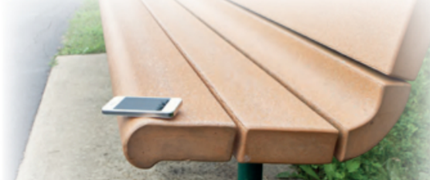
2 Rewrite the advice using had better instead of should or ought to.
(Viết lại lời khuyên bằng cách sử dụng had better thay vì should hoặc ought to.)
1 I don't think you should phone her now.
(Tôi không nghĩ bạn nên gọi điện thoại cho cô ấy bây giờ.)
You'd better not phone her now.
(Bạn không nên gọi điện thoại cho cô ấy bây giờ.)
2 I think we should save some money for the journey.
3 I don't think you should tell her about that email.
4 We ought to go home-it's late.
5 I think we should work hard for these exams.
6 I don't think you should drink that milk; it smells funny.
5.2 must vs have to and modals in the past
(must vs have to và động từ khiếm khuyết trong quá khứ)
We use must and have to for obligation.
Must expresses obligation imposed by the speaker while have to expresses external obligation.
I must / have to study hard for the final exam.
You must keep you room tidy, Jimmy.
In Viet Nam, all children have to go to school at the age of six.
We use had to for obligation in the past.
Mark had to stay home yesterday because he was ill.
We use may / might / could have for speculating about past events.
She may / might / could have sent me a message. (= It's possible she sent me a message, but I don't know.)
We use may / might not have (but not could not have) as the negative.
She might / may not have had her phone with her. (= It's possible she didn't have it, but I don't know.)
We use must have and can't / couldn't have to make logical deductions about the past.
You can't / couldn't have seen the new Batman film. It isn't out yet. (It's not possible that you saw it.)
You must have seen an old Batman film. (= That is the only possible explanation.)
We use should / shouldn't have to criticise past actions.
You should have taken a taxi. It wasn't safe to walk.
She shouldn't have phoned me so late. I was asleep.
Tạm dịch
Chúng ta sử dụng must và have to cho nghĩa vụ.
Must thể hiện nghĩa vụ do người nói áp đặt trong khi have to thể hiện sự bắt buộc đến từ bên ngoài.
Tôi phải học chăm chỉ cho kỳ thi cuối kỳ.
Bạn phải giữ phòng của bạn gọn gàng, Jimmy.
Ở Việt Nam, tất cả trẻ em phải đến trường từ sáu tuổi.
Chúng ta sử dụng had to cho nghĩa vụ trong quá khứ.
Mark đã phải ở nhà ngày hôm qua vì anh ấy bị ốm.
Chúng ta sử dụng may / might / could have để suy đoán về các sự kiện trong quá khứ.
Cô ấy có thể đã gửi cho tôi một tin nhắn. (= Có thể cô ấy đã gửi tin nhắn cho tôi, nhưng tôi không biết.)
Chúng ta sử dụng may / might not have (nhưng không dùng could not have) ở dạng phủ định.
Cô ấy có thể không mang theo điện thoại bên mình. (= Có thể cô ấy không có, nhưng tôi không biết.)
Chúng ta sử dụng must have và can't / could not have để suy luận logic về quá khứ.
Bạn không thể xem bộ phim Batman mới. Nó vẫn chưa ra. (Không thể là bạn đã nhìn thấy nó.)
Bạn hẳn đã xem một bộ phim Batman cũ. (= Đó là lời giải thích khả thi duy nhất.)
Chúng ta sử dụng should / should not have để chỉ trích hành động trong quá khứ.
Bạn nên đi taxi. Nó không an toàn để đi bộ.
Lẽ ra cô ấy không nên gọi điện cho tôi muộn như vậy. Tôi đã ngủ.
1 Choose the best words (a, b or c) to complete the sentences.
(Chọn từ đúng nhất (a, b hoặc c) để hoàn thành câu.)
1 You look freezing. You_____worn a coat.
a should have
b might not have
c could have
2 Ask that question again; the teacher _____ heard you.
a shouldn't have
b could have
c can't have
3 Your brother has been using your email account. You _____ told him your password.
a must have
b mustn't have
c couldn't have
4 Jack is really upset. You _____ laughed at him!
a may not have
b can't have
c shouldn't have
5 I sent you a postcard, but you _____ received it yet.
a may have
b should have
c might not have
6 Your phone is dead again. The instruction says you _____ recharge it after use.
a don't have to
b must have to
c have to
7 I can't remember when I last saw you. Maybe it was last April, or it ____ been in the summer.
a might have
b must have
c can't have
8 You ____ invite Sam to your party. He's a really nice guy.
a have to
b must
c don't have to
9 We were nearly late yesterday. We ____ run for the bus.
a have to
b must
c had to
2 Complete the second sentence in each pair to mean the same as the first. Use modals in the past.
(Hoàn thành câu thứ hai trong mỗi cặp để có nghĩa tương tự như câu đầu tiên. Sử dụng các động từ khiếm khuyết trong quá khứ.)
1 He can't have been at home.
(Anh ấy không thể ở nhà được.)
He must have been out.
(Anh ấy chắc đã ra ngoài.)
2 I shouldn't have refused the invitation.
I ________________ accepted the invitation.
3 She may not have passed the exam.
She ________________ failed the exam.
4 They must have arrived late.
They ________________ arrived early.
5 You can't have switched the TV off.
You ________________ left the TV on.
6 We should have paid by credit card.
We ________________ paid with cash.
7 They couldn't have stolen the car during the day.
They ________________ stolen the car at night.
8 The pilot might not have died in the accident.
The pilot ________________ survived the accident.
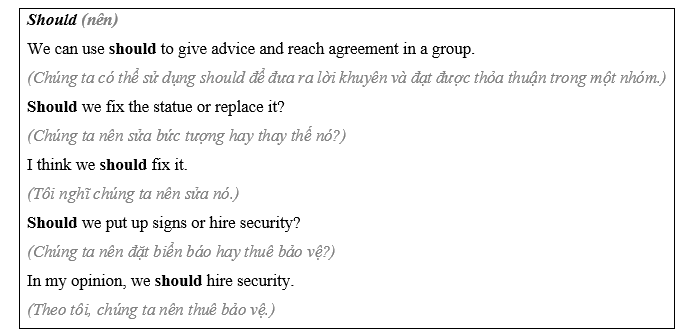
a. Look at the picture. What do you think the men are saying?
(Nhìn vào bức tranh. Bạn nghĩ những người đàn ông đang nói gì?)

b. Now, listen and check your ideas.
(Bây giờ, hãy lắng nghe và kiểm tra ý kiến của bạn.)
Should we repair the old apartments or knock them down?
(Nên sửa hay đập bỏ chung cư cũ?)
I think we should repair them.
(Tôi nghĩ chúng ta nên sửa chữa chúng.)
c. Listen and repeat.
(Lắng nghe và lặp lại.)
Should we repair the old apartments or knock them down?
(Nên sửa hay đập bỏ chung cư cũ?)
I think we should repair them.
(Tôi nghĩ chúng ta nên sửa chữa chúng.)
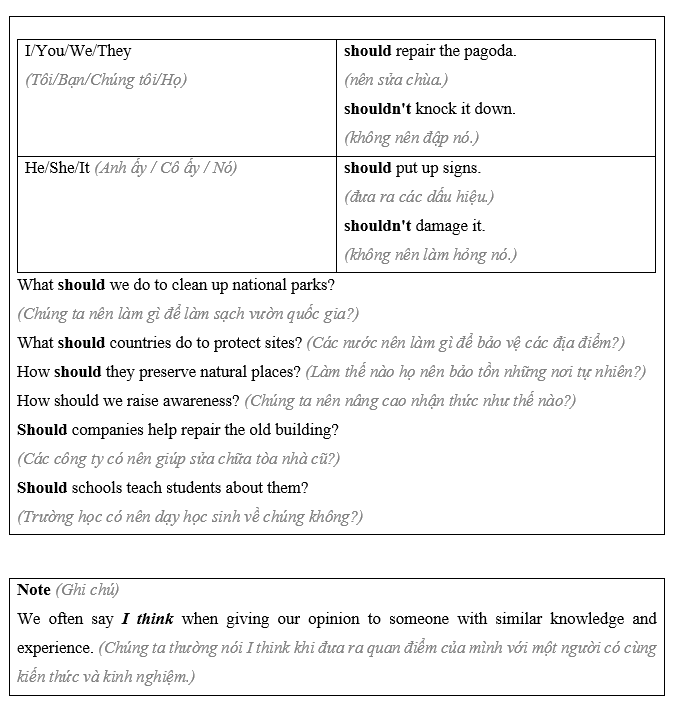
a. Unscramble the sentences.
(Sắp xếp lại câu.)
1. should/people/do/to/promote/tourism?/What
What should people do to promote tourism?
2. the/national/ot/visitors/parks/limit/we/think/to/number/l/ should
3.to/teach/should/Universities/preserve/how/old/buildings.
4. should/prevent/heritage/How/from/sites/wa/people/damaging
5. containers/should/sites/have/trash/lots/Heritage/of
b. Match the beginning and end of the sentences. Then, read the sentences to your partner.
(Nối đầu và cuối câu. Sau đó, đọc các câu cho đối tác của bạn.)
1. Young people should
2. Citics shouldn't
3. Tourism companies should
4. Nationalparks shouldn't
5. The government should
a. ... pass a law to stop building in natural heritage sites.
b. ... learn about the historical places in their country.
c. ... let companies knock down historical buildings .
d. ... promote the historical sites in their country.
e. ... allow visitors to food the wild animals in the park.
c. In pairs: What are some natural or historical places in your area that are getting older, damaged, or dirty? Which ones do you think should be preserved?
(Làm theo cặp: Đâu là một số địa điểm tự nhiên hoặc lịch sử trong khu vực của bạn đang trở nên cũ kỹ, hư hỏng hoặc bẩn thỉu? Những cái nào bạn nghĩ nên được bảo tồn?)
The pagoda is damaged. I think we should preserve it.
(Chùa bị hư hại. Tôi nghĩ chúng ta nên bảo tồn nó.)
Should we preserve the old cafés? (Có nên bảo tồn những quán cà phê xưa?)
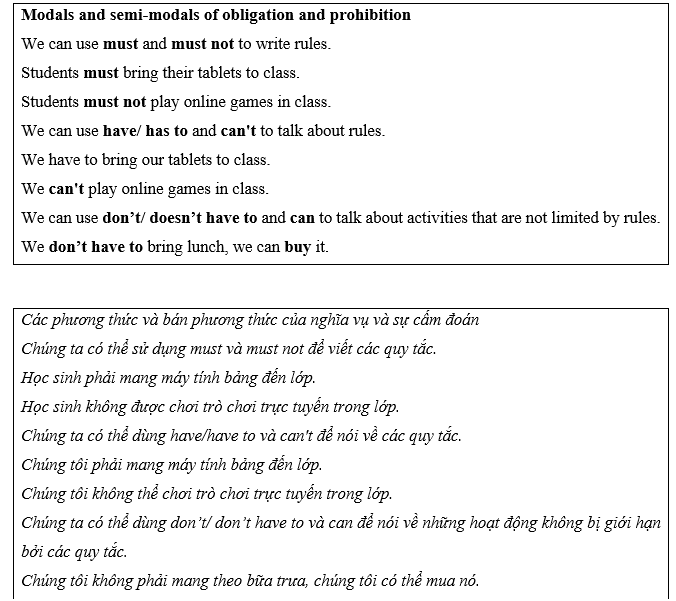
a. Look at the picture. What do you think the girl and boy are saying?
(Nhìn vào bức tranh. Bạn nghĩ cô gái và chàng trai đang nói gì?)
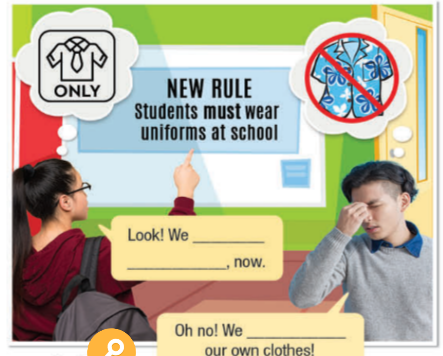
b. Now, listen and check your ideas.
(Bây giờ, hãy lắng nghe và kiểm tra ý tưởng của bạn.)
Look! We have to wear uniforms, now.
(Nhìn kìa! Bây giờ chúng ta phải mặc đồng phục.)
Oh no! We can’t wear our own clothes!
(Ôi không! Chúng ta không thể mặc quần áo của riêng mình!)
c. Listen and repeat.
(Lắng nghe và lặp lại.)
Look! We have to wear uniforms, now.
(Nhìn kìa! Bây giờ chúng ta phải mặc đồng phục.)
Oh no! We can’t wear our own clothes!
(Ôi không! Chúng ta không thể mặc quần áo của riêng mình!)
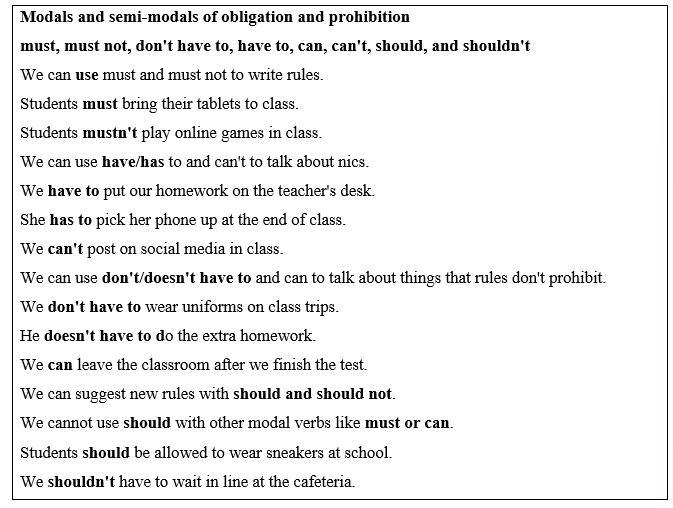
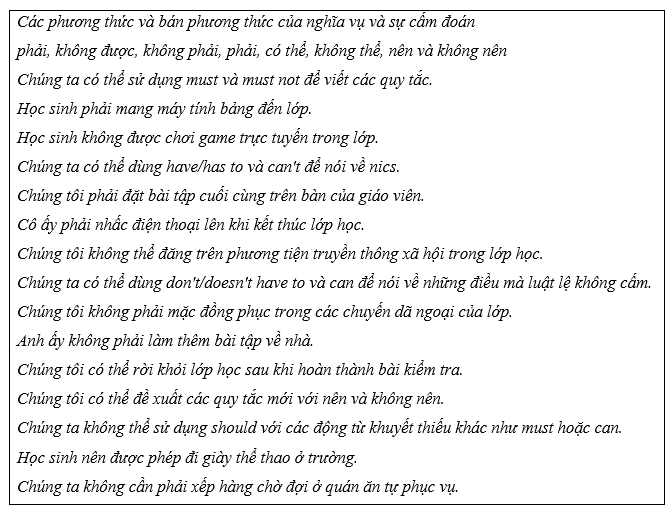
a. Unscramble the sentences.
(Sắp xếp lại câu.)
1. lake/care/ol/tablets/Students/must/their
Students must take care of their tablets.
2. drink/Can/or/we/in/eat/class?
3. lesson/We/have/tablets/bring/la/our/every/to
4. have/charge/dinesn't/at/her/tablet/home/Kate/tn
5. car/games/Students/tablets/thein/install/on
b. Circle the sentence with the similar meaning.
(Khoanh tròn câu có nghĩa tương tự.)
1. Students must charge their tablets before class.
(Học viên phải sạc máy tính bảng trước khi đến lớp.)
a. "We are allowed to charge our tablets during class."
("Chúng tôi được phép sạc máy tính bảng trong giờ học.")
b. "We have to charge our tablets before class."
("Chúng tôi phải sạc máy tính bảng trước khi đến lớp.")
c. "We don't have to charge our tablets before class."
("Chúng tôi không phải sạc máy tính bảng trước giờ học.")
d. "We shouldn't have to charge our tablets before class."
("Chúng ta không cần phải sạc máy tính bảng trước giờ học.")
2. "We can't post mean things on social media."
("Chúng tôi không thể đăng những thứ ác ý trên mạng xã hội.")
a. Students must past mean things on social media.
(Học sinh phải vượt qua những điều có ý nghĩa trên phương tiện truyền thông xã hội.)
b. Students shouldn't be allowed to post mean things on social media.
(Học sinh không được phép đăng những điều có ý nghĩa trên phương tiện truyền thông xã hội.)
c. Students don't have to post mean things on social media.
(Học sinh không cần phải đăng những điều có ý nghĩa trên phương tiện truyền thông xã hội.)
d. Students mustn't post mean things on social media.
(Học sinh không được đăng những điều có ý nghĩa trên phương tiện truyền thông xã hội.)
3. Students must not play online games in class.
(Học sinh không được chơi game online trong lớp.)
a. "We can't play online games in class."
("Chúng ta không thể chơi trò chơi trực tuyến trong lớp học.")
b. "We should be allowed to play online games in class."
("Chúng ta nên được phép chơi trò chơi trực tuyến trong lớp.")
c. "We shouldn't have to play online games in class."
("Chúng ta không nên chơi trò chơi trực tuyến trong lớp.")
d. "We don't have to play online games in class."
("Chúng ta không phải chơi trò chơi trực tuyến trong lớp.")
c. In pairs: Use modals and semi-modals to talk about the rules at your school.
(Làm theo cặp: Sử dụng các mô thức và bán mô thức để nói về các quy tắc ở trường của bạn.)
We can't be late for class, and have to bring a pen.
(Chúng tôi không thể đến lớp muộn và phải mang theo bút.)
Circle the correct words for the written and "spoken" rules.
(Khoanh tròn các từ đúng cho các quy tắc viết và "nói".)
1. Students must/must not damage the school's tablets.
2. "Students have to/can't play games on computers during study time."
3. "Teachers have to/aren't allowed to count and check tablets every afternoon to keep them safe."
4. Tablets must/must not be brought outside of the classroom.
5. "Students can’t/ don't have to do their homework on the tablets. They can use pen and paper."
Modals
must-have to
must - have to
• All hospital nurses must wear a uniform. (It's a rule.)
• All hospital nurses have to wear a uniform. (They are obliged to.)
• Ed broke his arm, so he must go to hospital. (It's necessary. It's urgent and important.)
• Ed broke his arm, so he has to go to hospital. (It's necessary.)
• I must stay in bed and rest for a week. (I believe it is necessary.)
•I have to stay in bed and rest for a week. (Someone else believes it is necessary.)
mustn't - don't have to
• You mustn't touch the medical devices. (It's against the rule.)
• You mustn't smoke in the hospital. (It's prohibited.)
• I don't have to buy the medicine. I have it at home. (It isn't necessary.)
Tạm dịch
must - have to
• Tất cả y tá bệnh viện phải mặc đồng phục. (Đó là một quy tắc.)
• Tất cả y tá bệnh viện phải mặc đồng phục. (Họ có nghĩa vụ.)
• Ed bị gãy tay nên anh ấy phải đến bệnh viện. (Điều đó là cần thiết. Nó khẩn cấp và quan trọng.)
• Ed bị gãy tay nên anh ấy phải đến bệnh viện. (Nó cần thiết.)
• Tôi phải nằm trên giường và nghỉ ngơi trong một tuần. (Tôi tin rằng nó là cần thiết.)
• Tôi phải nằm trên giường và nghỉ ngơi trong một tuần. (Một số người khác tin rằng điều đó là cần thiết.)
mustn't - don't have to
• Bạn không được chạm vào các thiết bị y tế. (Đó là trái với quy tắc.)
• Bạn không được hút thuốc trong bệnh viện. (Nó bị cấm.)
• Tôi không phải mua thuốc. Tôi có nó ở nhà. (Không cần thiết.)
1. Choose the correct option. Give a reason for your choice.
(Chọn phương án đúng. Đưa ra một lý do cho sự lựa chọn của bạn.)
1 I feel really unfit. I must/have to exercise three times a week to get fit.
2 All patients must/have to check in at the hospital reception. They are obliged to.
3 You must/have to put some ice on your swollen ankle. It's necessary.
4 I must/have to put these drops in my ear for three days according to the doctor.
5 The doctor must/has to see this patient right away. It's urgent.
6 All visitors must/have to park only in visitors' parking; it's the hospital rule.
7 My mum says I really must/have to stop eating junk food.
8 I must/have to get a prescription for my arthritis every month from the doctor.
9 I can't sleep well at night. I think I must/ have to find a way to help me sleep better.
10 You must/have to speak quietly in the doctor's office. It's a rule.
2. Fill in each gap with don't have to, doesn't have to or mustn't.
(Điền vào mỗi khoảng trống với don't have to, doesn't have to hoặc mustn’t.)
1 Karen _________ remove her bandage until the doctor says.
2 Mike_________ take antibiotics because he doesn't have a chest infection.
3 You _________ park in front of the emergency entrance; it's prohibited.
4 You _________ visit Jay in the morning; there are visiting hours in the evening, too.
5 They _________ stay in patients' rooms once visiting hours are over.
6 You _________ buy any plasters. There are still some in the medicine cabinet.
3. Read the notice. Fill in each gap with must, mustn't, have to or don't have to.
(Đọc thông báo. Điền vào mỗi chỗ trống với must, mustn't, have to hoặc don't have to.)
RULES FOR HOSPITAL VISITORS
1 Visitors are allowed only during visiting hours: 10 a.m.1 p.m. and 5 p.m. - 8 p.m.
2 Children under 14 are not allowed in the hospital.
3 Information is available at the reception.
4 Keep quiet while in patients' rooms.
5 There is a cafeteria for visitors.
1 You __________ visit the hospital between 10 a.m. - 1 p.m. and 5 p.m. - 8 p.m.
2 You __________ visit the hospital at 3 p.m.
3 You __________ be 14 years or older to enter the hospital.
4 You __________ ask for information at the reception.
5 You __________ make noise in patients' rooms.
6 You __________ bring food to the hospital. There's a cafeteria.
4. Complete the sentences with have to, don't have to, must or mustn't. Make the sentences so that they are true for you.
(Hoàn thành các câu với have to, don't have to, must hoặc mustn't. Đặt câu sao cho đúng với bạn.)
1 At home, I have to keep my room tidy.
(Ở nhà, tôi phải giữ phòng gọn gàng.)
2 At school, ______________________
3 In the library, ______________________
4 At the weekend, ______________________
5 When in a car, _____________________






